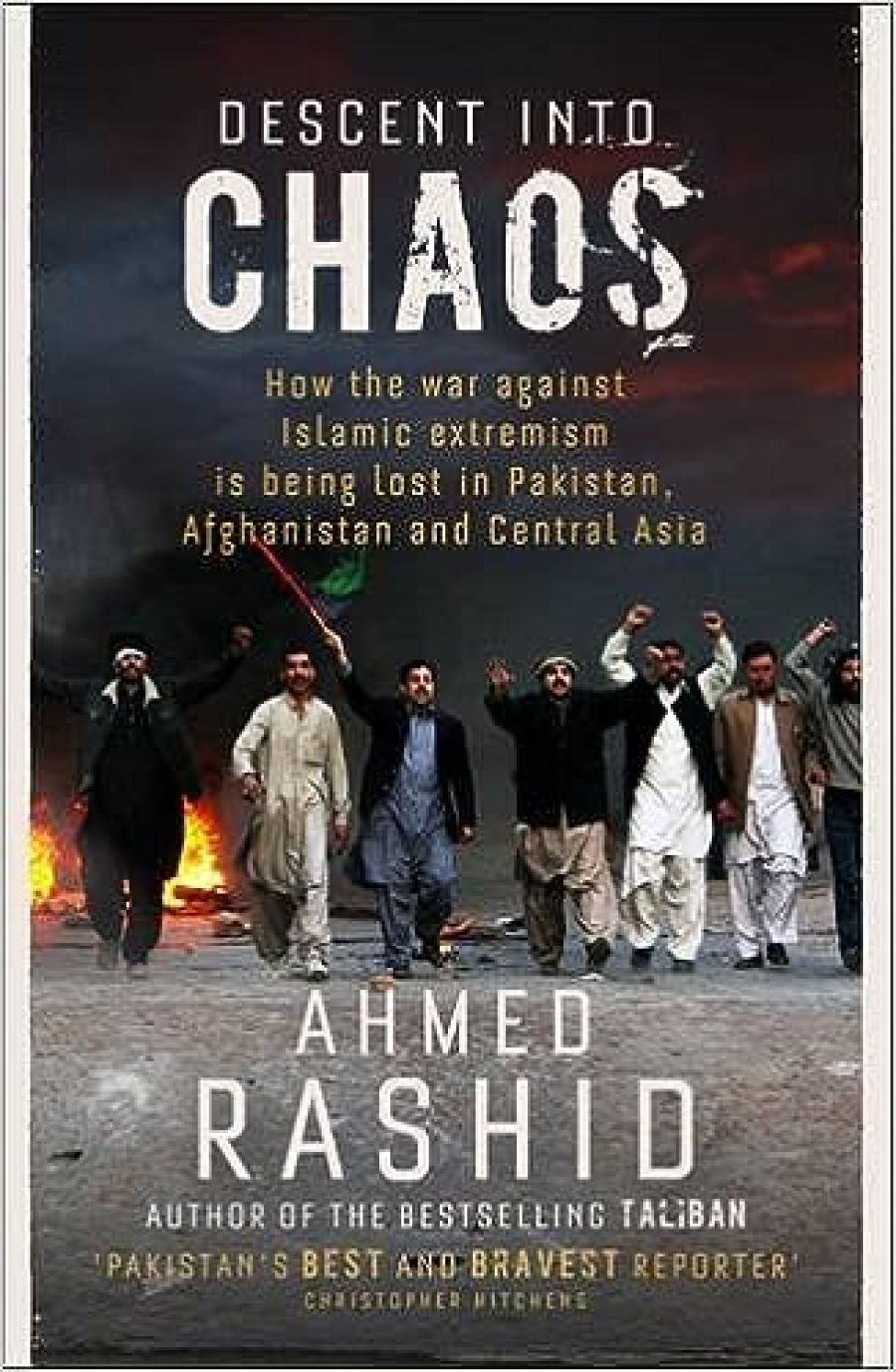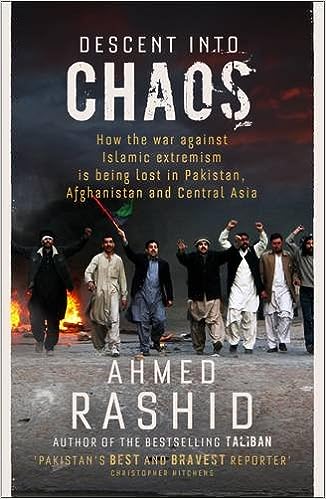
- Free Article: No
- Contents Category: Non-fiction
- Review Article: Yes
- Article Title: Why Afghanistan?
- Online Only: No
- Custom Highlight Text:
Two months ago, I was in Islamabad to address an international conference on suicide terrorism. The Pakistani army was engaged in heavy fighting with the Islamic militants in the Pashtun-dominated northern Pakistan, bordering Afghanistan. The security situation was deteriorating. Senior Pakistani intelligence officers were worried that it would lead to an escalation of suicide attacks. Their assessment was supported by the other government officials, including doctors working in the region, who told me of the widespread perception among Pashtuns that the predominantly Punjabi Pakistan army was committing genocide of the Pashtun nation and was thus turning the population against the army. The aerial bombings by Pakistani helicopter gunships and the US-NATO drones were causing many civilian casualties.
- Book 1 Title: Descent into Chaos
- Book 1 Subtitle: How the war against Islamic extremism is being lost in Pakistan, Afghanistan and Central Asia
- Book 1 Biblio: Allen Lane, $65 hb, 484 pp
- Book 1 Cover Small (400 x 600):

Ahmed Rashid’s new book, Descent into Chaos, provides an in-depth and riveting backdrop to understanding how and why things have reached this chaotic stage. Rashid is a highly respected Pakistani journalist and chronicler of events in Pakistan, Afghanistan and central Asia. His book on the Taliban (2000) became a global best-seller after 9/11 by introducing its readers to the repressive Taliban régime in Afghanistan which had given sanctuary to Al Qaeda.
Descent into Chaos is a blistering critique of the Bush administration’s failure to establish a viable peace in Afghanistan by reining in the duplicitous governments of Pakistan, Uzbekistan and other former Soviet central Asian countries. Its main focus, however, is on Afghanistan and Pakistan, to which seventeen of the eighteen chapters are devoted.
The book’s main thesis is that Western intervention was justified but marred by incompetence, arrogance and ignorance. Rashid suggests that the failure of the United States to secure Afghanistan and the region will lead to more global terrorism, nuclear proliferation and a global drug epidemic. He argues that the incoherent policies of the Bush administration legalised the authority and position of the notorious Afghan warlords in the new Afghan government, blocked a ‘Marshall Plan’ for Afghanistan and opposed the expansion of the multinational International Security Assistance Force. The American policy of ‘war on terror’ was driven by naked self-interest and hijacked by the neo-conservatives in the White House and transformed into a global conflict with Islam.
Rashid writes with authority, and his knowledge of the events is encyclopedic. His account of how the duplicitous policies of Pakistan’s premier spy agency, the Inter-Services Intelligence directorate (ISI), and the country’s former military ruler General Pervez Musharraf undermined the US-NATO operations in Afghanistan by continuing to provide a sanctuary and military support to the Taliban while apprehending and arresting some Islamic militants to appease Washington, is the stuff of spy novels. His friendship with Afghan President Hamid Karzai and the late Pakistani politician Benazir Bhutto gives his narratives a degree of authenticity not found in other works, but also illustrates his predilections. He claims that Bhutto overruled her political party (which wanted to topple Musharaf and not to bail him out) by accepting the ‘deal’ negotiated by the British and the Americans which aimed to use her ‘to revive Musharraf’s flagging fortunes and cover him with a varnish of legitimacy’.
Bhutto had calculated that this was the only chance for her to make a comeback and cleanse her reputation because only Musharraf, who was Urdu-speaking Muhajir, could be persuaded to accept her. ‘The next army chief and the majority of the generals were Punjabis, who would prefer to deal with fellow Punjabi Nawaz Sharif, who satisfied their political preferences: he was sufficiently right-wing, anti-American, and close to Islamic parties.’ In addition, Musharraf’s ‘schizophrenic behaviour’ toward Karzai heightened tensions and mistrust between the two leaders.
There is a curious paradox in Rashid’s analysis of why the United States and the West are losing the fight against extremism in Afghanistan, Pakistan and central Asia. Like the American neo-conservatives, he is an enthusiastic supporter of American military and economic intervention in the region in order to expunge Islamic extremism and to reshape and reform its societies for democracy. However, he is scathing about the Bush administration’s failure, incompetence, arrogance and ignorance. The ill-conceived and incoherent American policies, instead of pursuing democracy and encouraging reform, are making corrupt ruling élites more powerful and corrupt, and are making people angry.
But the book then goes on to argue that ‘solutions do not come easy’ in a region traumatised by the events of 9/11. The peoples and the régimes of Pakistan, Afghanistan and central Asia ‘have to understand that unless they themselves move their nations toward democracy, the chaos that presently surrounds them will, in time, overwhelm them’. Pakistan has shown a new beginning in 2008, and Afghanistan has the potential to do so. This is the stuff of liberal thinking, which contradicts Rashid’s enthusiastic support for unilateral American and Western military interventions in these countries.
Contrary to Rashid’s assertion that the 2008 elections have been a harbinger of the ‘new beginning’ in Pakistan, the political and security conditions have deteriorated and the country is teetering on the brink of bankruptcy. Australia is part of the group of countries called the ‘Friends of Pakistan’, which are trying to rescue Pakistan from an economic meltdown. The situation in Afghanistan is no better. A large part of the country in the south is now under the de facto control of the resurgent Taliban. The corruption in the Karzai government is rampant and reaches the highest levels of the government, including Karzai’s brother Wali.
Rashid dismisses claims by the former governor of Pakistan’s North West Frontier Province, Ali Jan Orakzai, who is a retired army general and a prominent Pashtun leader, that the Taliban movement is becoming ‘a national liberation movement’. Rashid believes this is a myth advocated by Musharraf and the ISI. Yet he cites a secret United States, NATO, and Afghan intelligence report on the Taliban which gives some credence to this claim. The report states that the Taliban comprised four distinct elements: hard-core extremist leaders linked to Al Qaeda, fighters recruited in Pakistan, unemployed youth and disaffected tribes. The demography, history and social organisation of forty-two million Pashtun people require serious consideration in understanding the nature of the Taliban insurgency.
Descent into Chaos is a well-written and encyclopedic account of recent history of Pakistan and Afghanistan. There is a problem, however, in that its impact is diluted by lengthy and detailed accounts of events and names which are somewhat distracting. This is a pity, because the Australian public needs to know more about the volatile political and security situation in these countries. This year, Australia will spend close to a billion dollars on its military and economic assistance in Afghanistan. One thousand soldiers are part of the International Security Assistance Force, and the Australian government is considering significantly increasing military and economic assistance to Afghanistan next year. Compared with the $42 billion which the United States spends, it is not much, but it is still a significant contribution compared with the other NATO countries. Yet Afghanistan is the only country for which the address of the Australian diplomatic presence is withheld on the Department of Foreign Affairs and Trade (DFAT) webpage for security reasons. According to one recent press report, DFAT refuses to make public any information of where the Australia’s diplomats are based in Kabul (they are located in the United States Embassy). The public are not being kept sufficiently informed.
Descent into Chaos is a timely book for readers to know why Australia is in Afghanistan and why it is trying to rescue Pakistan from the looming economic meltdown. There is much at stake, not only for these countries but for the whole world. But ‘more of the same’ policies are not the way forward. It seems obvious that long-term stability and peace in Pakistan, Afghanistan and central Asia will not come through the policies now being followed by the United States, NATO and Australia unless there is also an involvement of neighbouring powers, including China, India, Turkey and Russia.


Comments powered by CComment